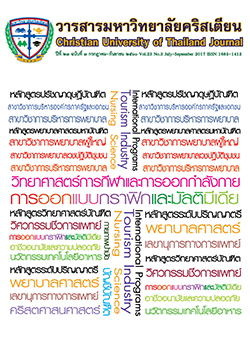การศึกษาแนวคิด การปฏิบัติและปัญหาเกี่ยวกับการระบุข้อบกพร่องในการเขียนของผู้สอนการเขียนภาษาอังกฤษในมหาวิทยาลัยของรัฐเขตภาคเหนือของประเทศไทย
คำสำคัญ:
ผู้สอนการเขียนภาษาอังกฤษ, การระบุข้อบกพร่อง, ความเชื่อของครูบทคัดย่อ
งานวิจัยฉบับนี้มีวัตถุประสงค์เพื่อศึกษาแนวคิดการปฏิบัติและปัญหาที่เกี่ยวกับการระบุข้อบกพร่องในการเขียนของผู้สอนการเขียนภาษาอังกฤษในมหาวิทยาลัยรัฐเขตภาคเหนือของประเทศไทย กลุ่มตัวอย่างเป็นผู้สอนการเขียนภาษาอังกฤษจำนวน 57 คนใน 18 มหาวิทยาลัยรัฐเขตภาคเหนือของประเทศไทย ใช้แบบสอบถามที่ประยุกต์จาก Lee (2003) ในการเก็บข้อมูล การวิเคราะห์ข้อมูลใช้สถิติเชิงพรรณนาคือความถี่ ร้อยละ ค่าเฉลี่ยและส่วนเบี่ยงเบนมาตรฐาน ผลการศึกษาพบว่าผู้สอนส่วนใหญ่เชื่อว่าการระบุข้อบกพร่องในการเขียนของผู้เรียนมีความจำเป็นและมีประโยชน์ในการเขียนของผู้เรียนเพราะจุดประสงค์หลักของการระบุข้อบกพร่องในการเขียนของผู้เรียนในงานวิจัยนี้คือเพื่อช่วยพัฒนาการเขียนของผู้เรียน นอกจากนี้ผู้สอนส่วนใหญ่จะระบุข้อบกพร่องในการเขียนของผู้เรียน โดยระบุข้อบกพร่องทั้งหมดโดยการใช้สัญลักษณ์ และในด้านปัญหาของผู้สอนที่เกี่ยวกับการระบุข้อบกพร่องในงานเขียนในงานวิจัยนี้พบว่าการใช้เวลาเป็นปัญหาหลักที่ผู้สอนพบบ่อยมาก ผู้สอนไม่มีเวลาในการระบุข้อบกพร่องเนื่องจากมีหน้าที่รับผิดชอบอื่นๆ ผลของการวิจัยนี้มีข้อเสนอแนะว่าผู้สอนการเขียนควรนำการระบุข้อบกพร่องไปใช้ประโยชน์กับผู้เรียนโดยการกระตุ้นและพัฒนาการเขียน อย่างไรก็ดี จำนวนของผู้เรียนการเขียน ภาระการสอนและหน้าที่อื่นๆของผู้สอนการเขียนภาษาอังกฤษเป็นภาษาต่างประเทศก็เป็นอุปสรรคสำคัญในการระบุข้อบกพร่องใน การเขียนที่มีประสิทธิภาพ
เอกสารอ้างอิง
Alqurashi, F. (2015). "Perspectives of Saudi EFL learners towards teacher response in writing courses". International Journal of English Linguistics. 5(5) : 37-46.
Bitcherner, J. (2008). "Evidence in support of written corrective feedback". Journal of Second Language Writing. (17) : 102-108.
Bitcherner, J., Young, S., and Cameron, D. (2005). "The effect of different types of corrective feedback on ESL student writing". Journal of Second Language Writing . (14) : 191-205.
Brender, A. (1998). Conferencing: An interactive way to teach writing. [Online]. Retrieved September 15, 2016, from https://jalt-publications.org/old_tlt/files/98/jul/brender.html.
Corpuz, V. A. (2011). Error correction in second language writing: Teachers' beliefs, practices, and students' preferences. Master Thesis. Queenland University of Technology, Australia.
Fathman, A., and Whalley, E. (1990). Teacher response to student writing: Focus on form versus content. New York: Cambridge University Press.
Ferris, D. R. (2002). Treatment of error in second language student writing. Michigan: The University of Michigan Press.
Ferris, D. R., and Helt, M. (2000). "Was Truscott right? New evidence on the effects of error correction in L2 writing classes". Paper presented at the American Association of Applied Linguistics Conference. March 11-14, 2000, Vancouver, B.C.
Ferris, D. R., and Hedgcock, J. S. (1998). Teaching ESL composition: Purpose, process, and practice. Mahwah. 2nd edition. N.J.: Lawrence Erlbaum Associates.
Ferris, D. R., Chaney, S. J., Komura, K., Robert, B. J., and Mckee, S. (2000). "Does error feedback help student writers? New evidence on the short- and long-term effects of written error correction". Manuscript submitted for publication.
Ferris, D. R., and Roberts, B. (2001). "Error Feedback in L2 writing classes: How explicit does it need to be?". Journal of Second Language Writing. ( 10) : 161-184.
Gu?nette, D. and Lyster, R. (2013). "Written Corrective Feedback and Its Challenges for Pre-Service ESL Teachers". The Canadian Modern Language Review. 69(2) : 129-153.
Gunn, C., and Raven, J. (2005). "Evaluating teacher feedback in writing classes". Academic Exchange Quarterly. 9 (2) : 265-269.
Jodaie, M. and Farrokhi, F. (2012). "An exploration of Private Language Institute Teachers' Perceptions of Written Grammar Feedback in EFL Classes". English Language Teaching. (5) : 58-67.
Junqueira, L. and Payant, C. (2015). "I just want to do it right, but it's so hard": A novice teacher's written feedback beliefs and practices. Journal of Second Language Writing. (27) : 19-36.
Lee, I. (1997). "ESL learners' performance in error correction in writing: some implications for teaching". System. (25) : 465-77.
Lee, I. (2003). "L2 writing teachers' perspective, practices and problems regarding error feedback". Assessing Writing.(8) : 216-237.
Lee, I. (2009). "Ten mismatches between teachers' beliefs and written feedback practice". ELT J. 63(1) : 13-22.
Leki, I. (1991). "The preferences of ESL students for error correction in college level writing classes". Foreign Language Annals. (3) : 203-218.
Leng, K. T. P. (2014). "An analysis of written feedback on ESL students' writing". Procedia-Social and Behavioral Sciences. (123) : 389-397.
Li, J. and Barnard, R. (2011)."Academic tutors' belief about and practices of giving feedback on students' written assignments: A New Zealand case study". Assessing Writing. (16) : 137-148.
Mcmartin-Miller, C. (2014) "How much feedback is enough?: Instructor practices and student attitudes toward error treatment in second language writing". Assessing Writing.(19) : 24-35.
Paiva, K. S. (2011). Brazilian English as foreign language teachers' beliefs about grammar-based feedback on L2 writing. Graduate Thesis and Dissertations. Iowa State University.
Polio, C., Fleck, C., and Leder, N. (1998). "If only I had more time": ESL learners' changes in linguistic accuracy on essay revisions". Journal of Second Language Writing. (7) : 43-68.
Race, P. (2001). "Using feedback to help students to learn". The Higher Education Academy, York. [Online]. Retrieved July 16, 2016, fromhttps://www.saide.org.za/sites/default/files/course_design/Race%2034%20Using_feedback.pdf
Raimes, A. (1983). Techniques in teaching writing. New York: Oxford University Press.
Sampson, A. (2012). "Coded and uncoded error feedback: Effect on error frequencies in adult Colombian EFL learners' writing". System. ( 40) : 494-504.
Sheppard, K. (1992). "Two feedback types: Do they make a difference?". RELC Journal. (23) : 103-110.
Srichanyachon, N. (2012). "Teacher written feedback for L2 learners' writing development". Silpakorn University Journal of Social Sciences, Humanities, and Arts. 12(1) : 7-17.
Truscott, J. (1996). "The case against grammar correction in L2 writing classes". Language Learning. (46) : 327-69.
Wen, Y. (2013). "Teacher written feedback on L2 student writings". Journal of Language Teaching and Research. 4(2) : 427-431.
William, J. G. (2003). "Providing feedback on ESL students' written assignments". The internet TESL Journal. 9(10).[Online]. Retrieved September 2, 2016, fromhttps://iteslj.org/Techniques/Williams-Feedback.html.
Zacharias, N. T. (2007). "Teacher and student attitudes toward teacher feedback". Regional Language Centre Journal. 38(1). 38-52.



